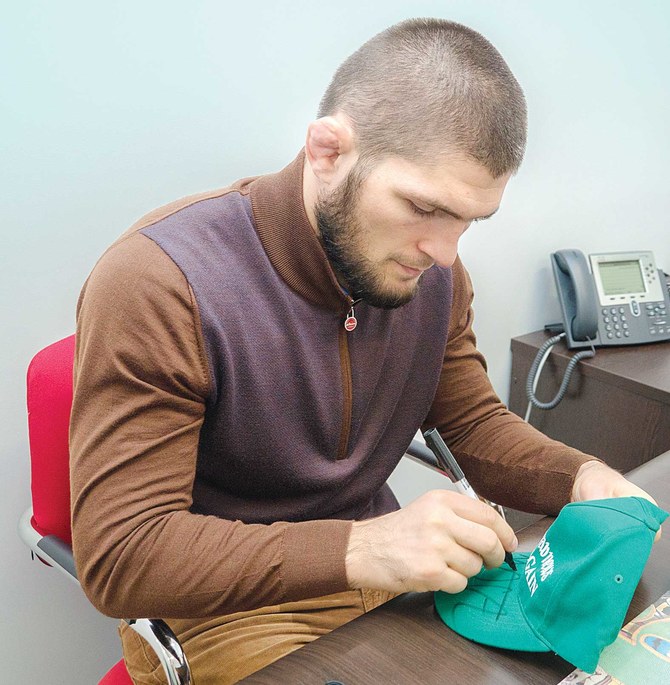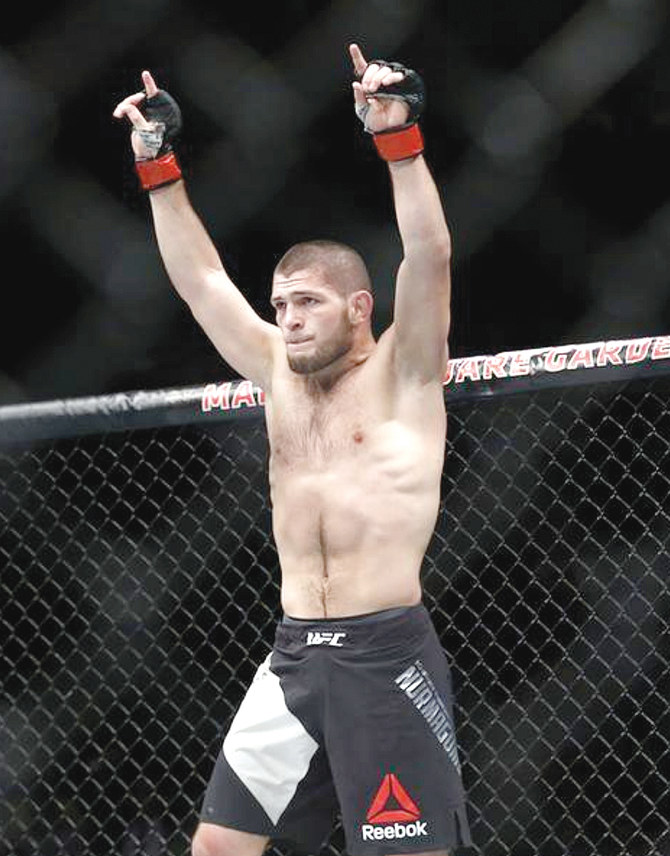MOSCOW: Mixed Martial Arts (MMA) fighting has become the world’s most innovative sport, mainly due to the growth of the Ultimate Fighting Championship (UFC), an American MMA promotion company that brought fighters from various disciplines — from jiu-jitsu to kickboxing — to battle it out in a cage.
One such fighter is Khabib “the Eagle” Nurmagomedov, who has taken the MMA world by storm.
A ferocious wrestler hailing from the Dagestan region, Khabib holds a professional record of 28 wins with no losses. He was crowned the UFC Lightweight Champion after defeating Al Iaquinta in New York in April 2018. His latest win to defend his title was against Dustin Poirier in Abu Dhabi on Sept. 9, 2019.
Arab News spoke to Khabib in Moscow about the future of the sport in the Arab world, which he sees as promising but still needs time to grow.
BIO
• Age: 31
• Height: 5’10”
• Weight: 155lbs
• Wins: 28
• Losses: 0
• Reach: 70”
“The sport is very famous in the region. Arabs love competing with each other and if you look at history, Arabs are warriors with very good spirits. They just need a little bit of time,” he said.
“Like Russia and Dagestan, it was different 10 years ago and now the sport has completely changed. I know it is difficult to make new stars, champions and athletes. I think in the next decade, a lot of Arabs are going to be top fighters.”
After being crowned champion, he was given the opportunity to defend his title against Conor McGregor, one of the most famous names in the sport. The match was dubbed the biggest fight in MMA history, drawing in 2.4 million pay-per-view buys, the highest of any UFC fight.
UFC RECORD
• 28-0 undefeated
• 8 wins by knockout
• 10 wins by submission
Khabib defeated McGregor in a rear-naked chokehold in the fourth round of their acrimonious fight last October, placing him on the world stage.
His ability to take down, control and keep his opponents on the floor — overwhelming them with damaging strikes — make him stand out from the other grapplers in MMA. Discipline, commitment and years of rigorous training in the mountains of his native Dagestan have helped him become the exceptional fighter and dominant force he is today.
In his latest fight in UFC 242 in Abu Dhabi, Khabib defended his belt by beating former interim American Lightweight Champion Dustin Poirier.
Arab News recently spoke to Khabib “The Eagle” Nurmagomedov, who has taken the #MMA world by storm, and he had a message for all of his fans in #SaudiArabia... (@TeamKhabib) (@ufc)
Full interview: https://t.co/CvN3CouaWm pic.twitter.com/Jz8aVXycPC
— Arab News (@arabnews) October 14, 2019
“I came to Abu Dhabi almost three weeks before the fight as I was worried about the jet lag and needed to get accustomed to the climate.
“It was an amazing experience for me as many people from my native Dagestan, the (former) USSR countries and my friends came to watch the match live.
“I want my next fight to be in Russia. I last fought here almost 10 years ago, in 2011, and I really want to go again. This is my goal for the match.”
Next month, Saudi Arabia’s amateur MMA outfit heads to Dagestan to train with Khabib’s team. “Over 15 people will come to my camp and train with my father and my team for a couple of weeks,” he said.
The sport is very famous in the region. Arabs love competing with each other.
Khabib Nurmagomedov
Even though “the Eagle” is flying high in the UFC, he is keeping his feet on the ground and not getting carried away by his success.
“I am focused on this now and at the moment I see it as ‘I’m almost there.’ I think that a few more years of fighting will be my limit. I do not want to fight all my life. A lot of young, hungry guys are coming and I know to be undefeated and undisputed is impossible. One day, you are going to lose and one day you need to stop, you just have to know when.
“I am going to compete in the coming years. I am 31-years-old, which is not too old for the sport, but I will reach my limit by the age of 33 or 34,” he said.
“Right now, I have a couple more years to compete with the toughest challengers in the world. Whatever opponent they give me, I am going to fight and improve my legacy and self. I want to face the best fighters in the world.”
Khabib hopes his next fight will be in Russia, which it was announced this week will be against Tony Ferguson who holds a 12 win-zero loss record in UFC.
































